Understanding ABA Therapy and Its Role in Autism
Applied Behavior Analysis (ABA) therapy is a science-based intervention widely recognized for its effectiveness in supporting individuals with autism. By focusing on understanding and modifying behavior through learning principles, ABA therapy aims to enhance communication, social skills, independence, and reduce challenging behaviors. This article explores how ABA therapy specifically promotes peer engagement during play, a crucial area for social development in children with autism.
What Is ABA Therapy in Autism Treatment?
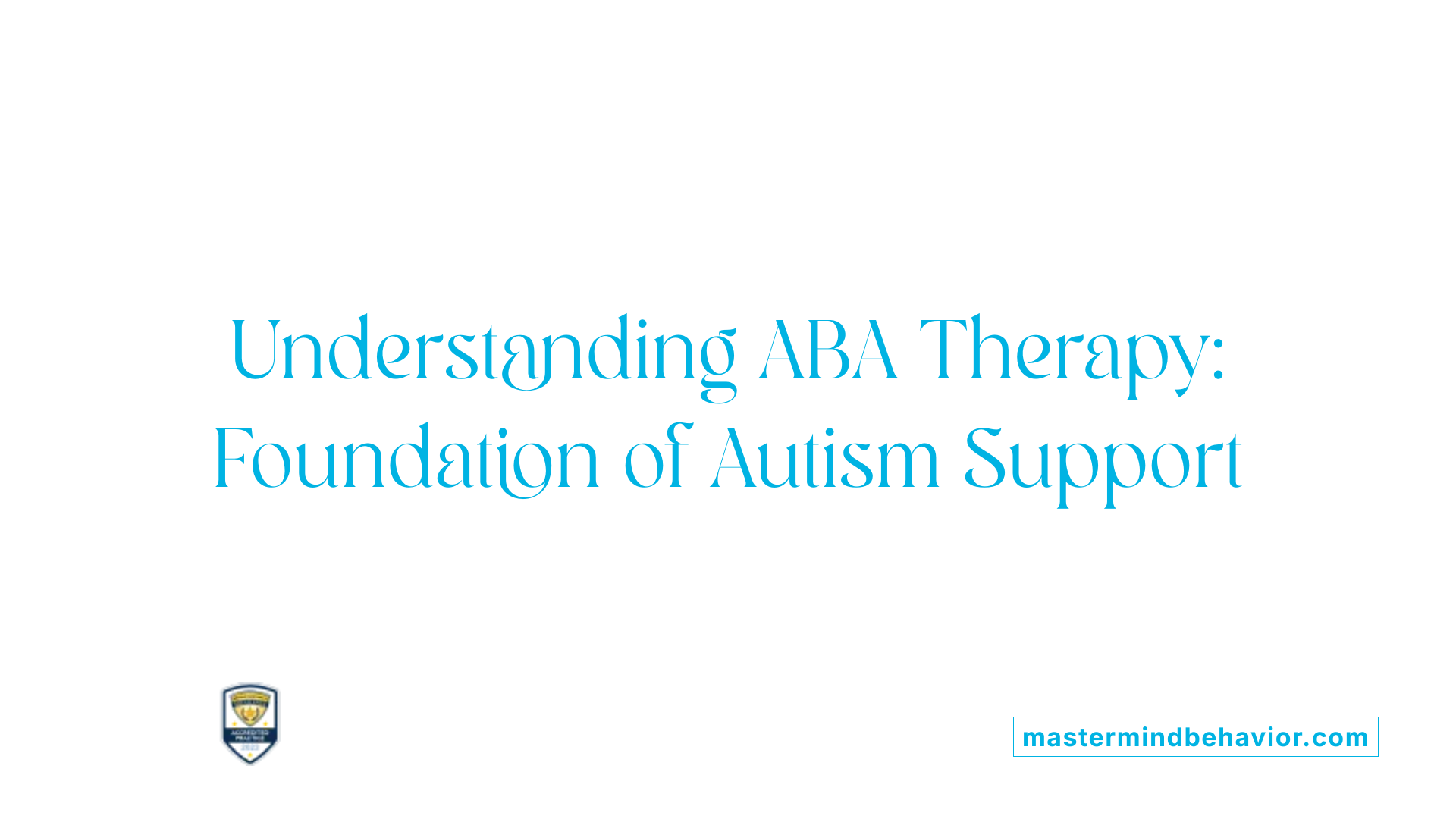
What is applied behavior analysis (ABA) therapy in the context of autism treatment?
Applied Behavior Analysis (ABA) therapy is a scientifically supported approach aimed at improving socially significant skills in children with autism. It focuses on understanding behavior through learning principles and modifies it to increase helpful behaviors like communication and social interaction while reducing challenging ones. ABA breaks down skills into small, teachable steps and applies positive reinforcement to encourage learning.
What are the fundamental principles of ABA therapy?
ABA therapy is guided by key principles such as positive reinforcement, where desirable behaviors are rewarded to strengthen them. Data collection plays a significant role, allowing therapists to monitor progress and adjust interventions. Individualized plans ensure therapy is tailored to the unique needs of each child. The ABC model—examining the Antecedents, Behaviors, and Consequences—helps in analyzing and shaping behaviors effectively.
How is ABA therapy delivered in varied ways, including naturalistic play-based approaches?
ABA therapy is flexible and can be delivered through multiple methods. Traditional approaches include discrete trial training, which involves structured teaching of specific skills. Alternatively, naturalistic, play-based approaches incorporate learning into everyday activities like cooperative puzzles, snacktime, and pretend play, fostering social engagement naturally. For example, the Early Start Denver Model blends behavioral and developmental techniques in playful routines, often within home or daycare settings. Training daycare staff to apply ABA strategies reinforces learning consistency, while collaboration with families ensures skill generalization across environments.
ABA therapy’s comprehensive framework combines behavioral analysis with naturalistic settings to promote meaningful skill development, interpersonal growth, and greater independence for children with autism.
Benefits of ABA Therapy for Social and Peer Engagement Skills
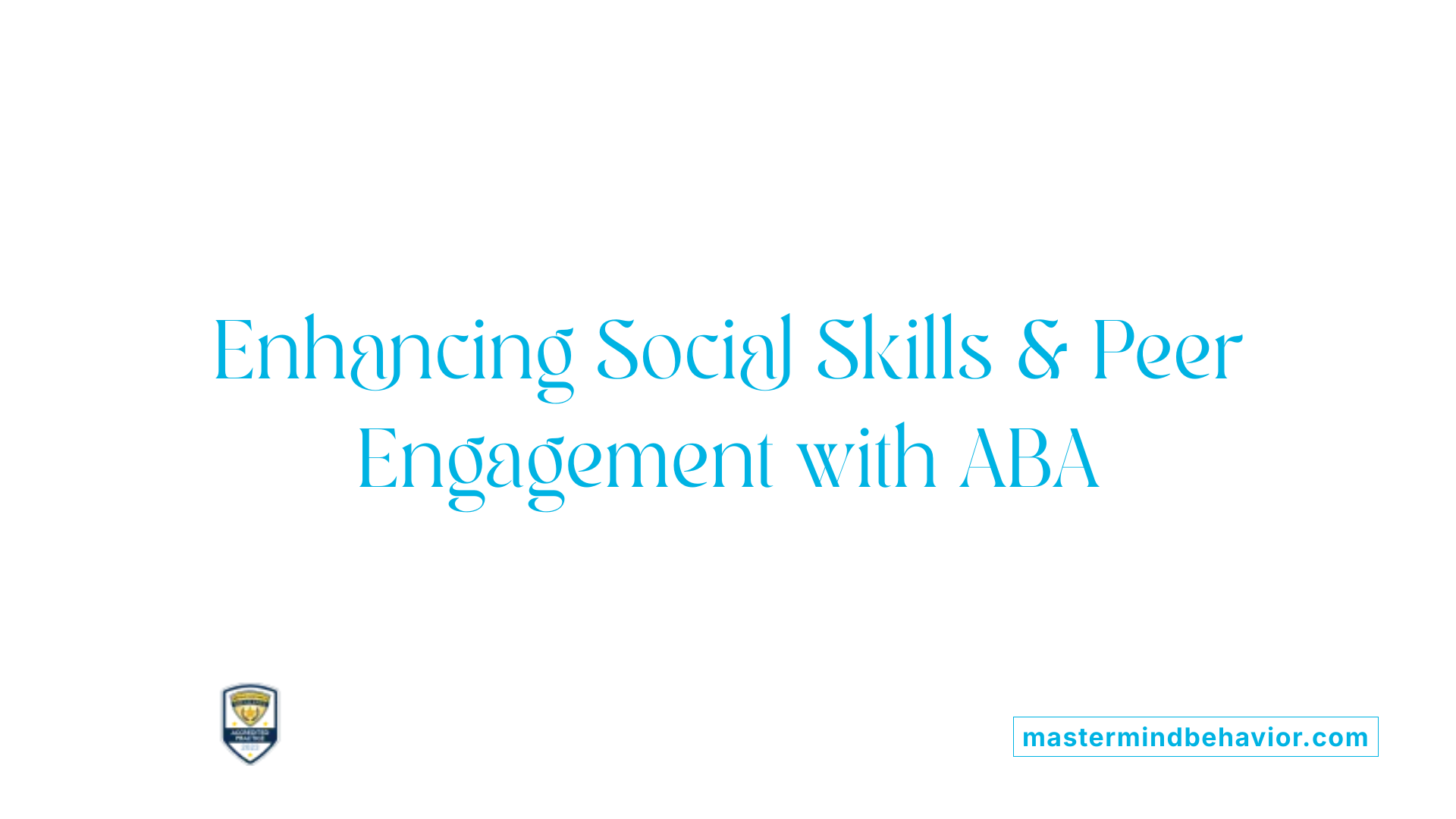
What are the benefits of behavioral analysis therapy for individuals with autism?
Behavioral analysis therapy, especially Applied Behavior Analysis (ABA), is a proven approach that enhances multiple areas of development in individuals with autism through targeted, individualized plans. One of the major benefits is the notable improvement in communication and social interactions. By breaking down skills into small, teachable steps and applying positive reinforcement, ABA therapy encourages natural learning opportunities during everyday activities.
Enhancements in communication and social interactions
ABA strategies embedded within natural settings—like daycare routines—promote social engagement and peer interaction. Activities such as cooperative puzzles, pretend play, and snacktime provide natural contexts where children can practice communication and social skills with peers. These naturalistic interventions make learning enjoyable and meaningful.
Reduction of challenging behaviors
Using the ABC model (Antecedents, Behaviors, Consequences), ABA identifies triggers and reinforcers to reduce challenging behaviors effectively. Consistent application of reinforcement and prompting by trained daycare staff and caregivers supports behavior change and helps children respond adaptively to social cues.
Developmental gains through early interventions
Early and intensive use of ABA leads to substantial developmental progress, including increased independence in daily tasks and enhanced peer engagement. Consistent data collection allows therapists to tailor approaches to each child’s needs, ensuring ongoing improvements.
Positive impact on quality of life
Overall, ABA therapy empowers children with autism to build essential social and communication skills, which in turn enrich their quality of life. They become more competent participants in social and educational settings, fostering inclusion and personal growth.
Integrating Peer Engagement Strategies in Play Through ABA
What are Naturalistic Developmental Behavioral Interventions (NDBI)?
Naturalistic Developmental Behavioral Interventions (NDBI) combine the principles of Applied Behavior Analysis (ABA) with developmental theory to create effective approaches for children with autism. They emphasize learning through natural, child-led interactions rather than structured drills, making social engagement more meaningful and motivating.
Which play activities foster peer social interaction?
Activities like cooperative puzzles, train play, snacktime, pretend pizza preparation, modified physical games, puppet-making, and cooking are excellent examples. These playful settings provide natural opportunities for children to interact, share, take turns, and communicate, thereby promoting social skills in a fun, relaxed environment.
How are ABA principles embedded in these activities to promote peer engagement?
ABA breaks complex skills into small, teachable steps using positive reinforcement to encourage desired behaviors. In the context of natural play activities, therapists and daycare staff use prompts and reinforcement to guide children through social interactions. For example, during snacktime, a child might receive encouragement for sharing or requesting items politely. Data is collected consistently to monitor progress and adjust strategies accordingly.
Embedding ABA in such naturalistic activities ensures that interventions are meaningful and generalized to real-life situations. Training daycare staff to use reinforcement strategies consistently during these play activities helps maintain momentum and encourages children to engage with peers spontaneously. Collaboration with families further supports skill generalization beyond the daycare setting.
| Element | Description | Example |
|---|---|---|
| Naturalistic Developmental Behavioral Interventions (NDBI) | An approach combining ABA and developmental strategies | Using child-led play to teach social skills |
| Peer Engagement Activities | Play routines promoting interaction | Cooperative puzzles, pretend pizza prep |
| ABA Principles Applied | Breaking down skills, positive reinforcement, data collection | Encouraging turn-taking with praise during train play |
| Staff Training | Equipping daycare workers with ABA techniques | Teaching prompting and reinforcement use |
| Family Collaboration | Coaching families to maintain consistency | Sharing progress updates and home activity ideas |
By intertwining natural play with ABA strategies, NDBI supports meaningful peer engagement, helping children with autism develop social skills within their everyday environments.
Role of Specialized Professionals in Delivering ABA Therapy
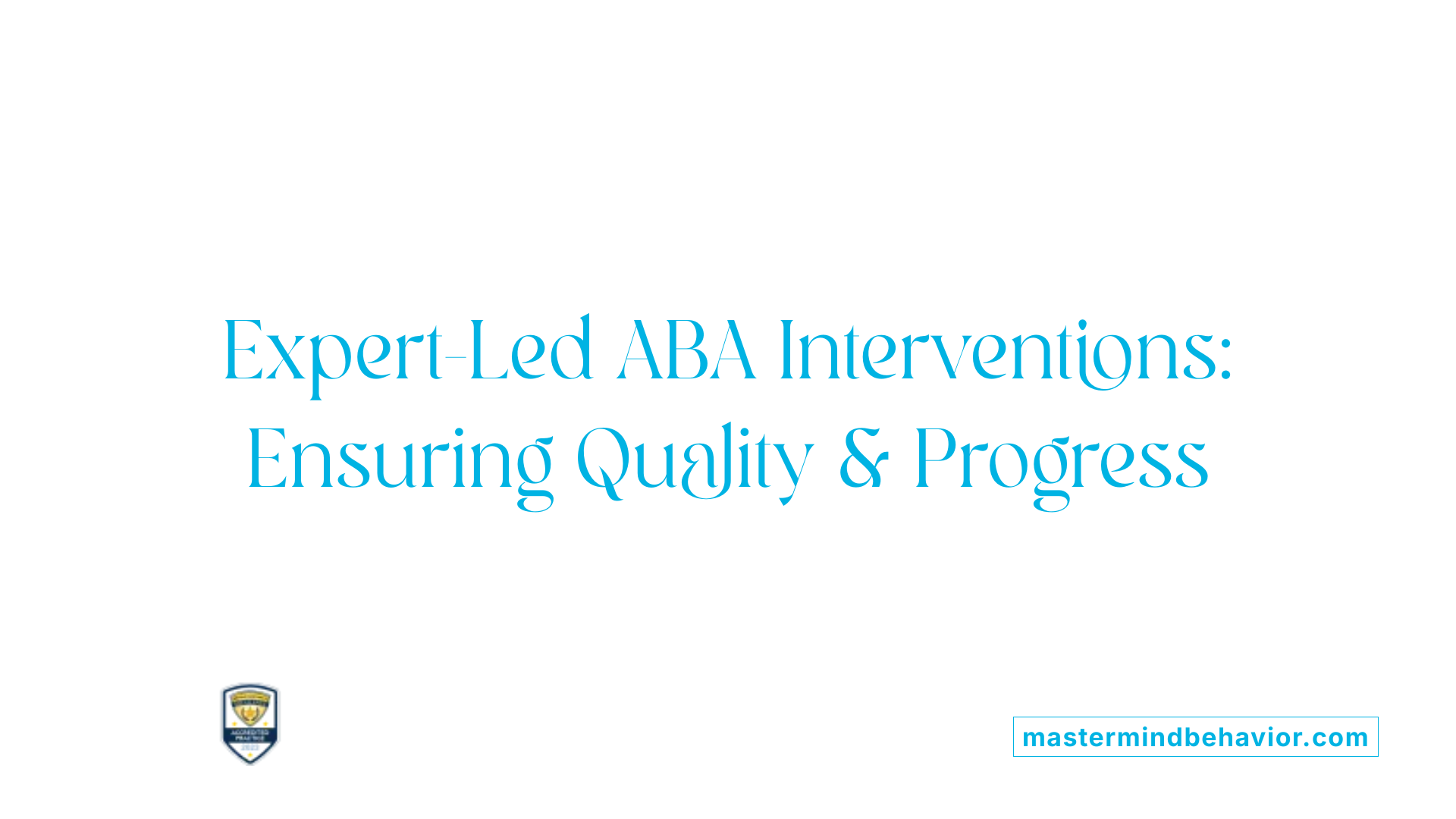
How Do Specialized Companies and Professionals Provide Behavioral Analysis Therapy for Autism?
Specialized companies and professionals utilize a structured approach to Applied Behavior Analysis (ABA) therapy by first conducting detailed assessments of the child's unique behavioral patterns and needs. Based on these evaluations, personalized intervention plans are crafted. These plans focus on teaching key skills such as communication, social interaction, and daily living activities using evidence-based methods like positive reinforcement.
Assessment and Personalized Program Development
Assessment is critical—it identifies target behaviors and developmental goals tailored to each child. The resulting programs break complex skills into manageable steps that facilitate effective learning and skill mastery over time.
Supervision by Board Certified Behavior Analysts (BCBAs)
Board Certified Behavior Analysts oversee all aspects of therapy, ensuring strategies align with best practices and scientific standards. Their supervision guarantees that interventions remain effective and are adapted as the child progresses.
Caregiver Involvement and Coaching
Parents and caregivers participate in therapy through coaching sessions trained by behavior therapists. This partnership helps embed ABA techniques into everyday routines, enhancing consistency and supporting skill generalization beyond therapy sessions.
Varied Therapy Settings
ABA therapy is flexible and delivered across multiple environments such as clinics, homes, and community settings like daycare centers. Each setting uses engaging materials tailored to the child's interests, such as toys and sensory tools, to encourage active participation and meaningful learning.
The combination of thorough assessment, expert supervision, collaborative family involvement, and adaptive environments forms the foundation for effective ABA therapy. This holistic approach supports ongoing progress, fostering independence and improved social abilities in children with autism.
Embedding ABA Techniques Within Daycare and Natural Environments

How is daycare staff trained in ABA methods?
Daycare staff receives specialized training from behavior therapists focused on the principles of Applied Behavior Analysis (ABA). This training includes the implementation of reinforcement strategies, prompting techniques, and accurate data collection. Staff learn to recognize specific behaviors and apply positive reinforcement to encourage desired skills.
How are reinforcement strategies and prompting applied in daycare?
Reinforcement strategies are integrated seamlessly into daycare routines, such as during snacktime or play activities. Staff use prompts to guide children toward target behaviors and provide immediate positive feedback when those behaviors occur. This structured approach helps shape social and communication skills while reducing challenging behaviors.
How is consistency and skill generalization maintained in natural contexts?
Consistency is ensured through ongoing coaching and communication between behavior therapists, daycare staff, and families. Such collaboration supports the generalization of skills across settings, from daycare to home. Embedding ABA strategies in natural environments like cooperative puzzles or modified games promotes social engagement through regular, meaningful interactions among peers.
By combining training, practical application, and collaborative support, ABA techniques become a natural part of the child's daily experience, fostering effective learning and social growth.
Tracking Progress and Adjusting ABA Interventions for Optimal Outcomes
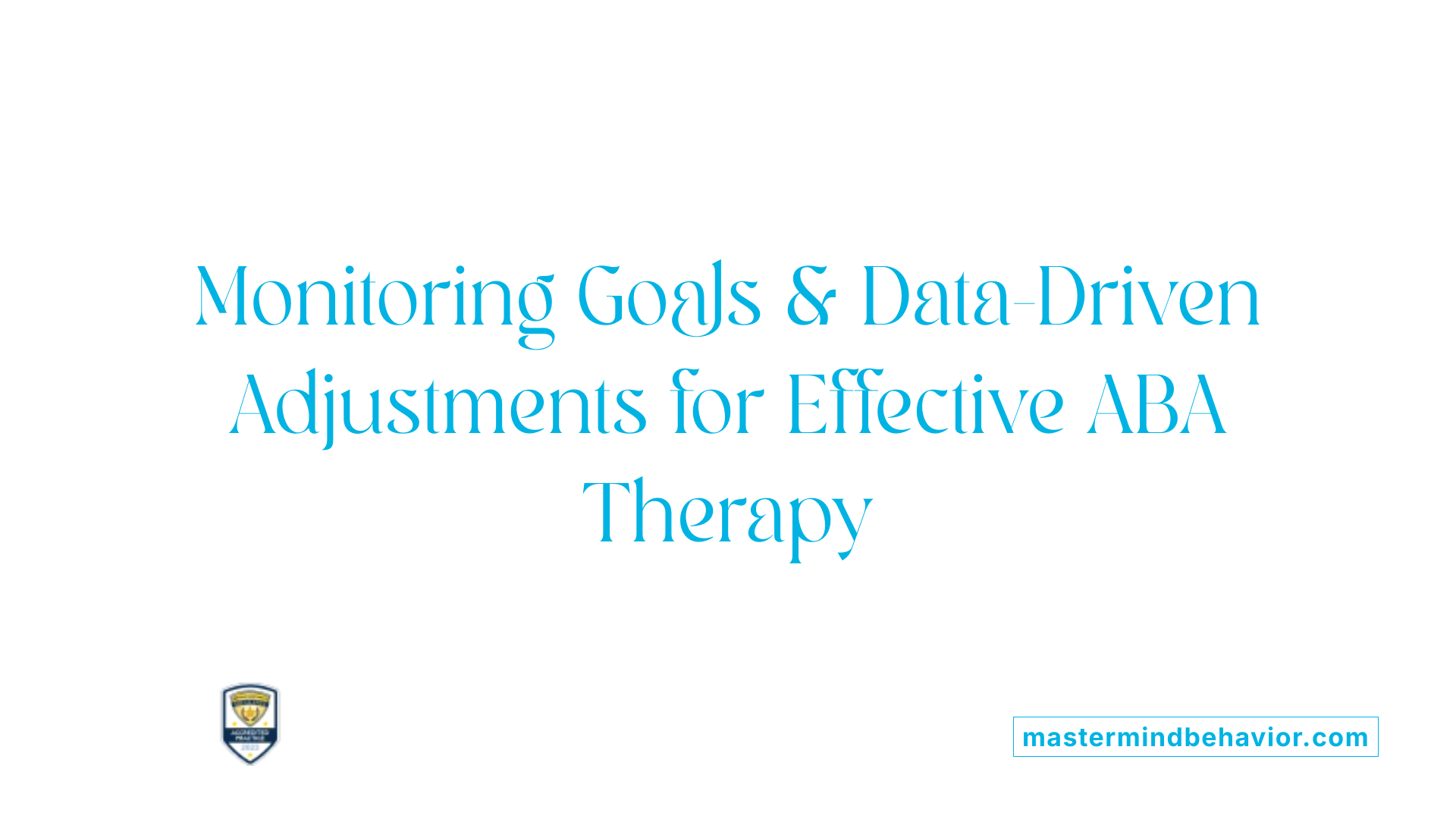
Why is data collection and monitoring important in ABA therapy?
Data collection is essential in ABA therapy because it provides objective information on a child's behavior and learning progress. By systematically tracking responses, therapists can accurately measure which skills the child is acquiring and which areas need more attention. This evidence-based approach ensures that interventions are effective and tailored to each child's unique needs.
How is data used to adapt goals and strategies?
Therapists use collected data to regularly assess a child’s progress. If certain goals are not being met, or behaviors are not improving as expected, the data guides adjustments to intervention plans. This could mean changing reinforcement techniques, modifying teaching steps, or introducing new activities. This flexible approach helps maintain motivation and promotes consistent advancement.
How do ABA professionals ensure interventions meet evolving needs?
Children develop at different rates, and their needs can change over time. Continuous monitoring via data collection allows therapists and daycare staff to identify these changes promptly. Adjustments in strategies can then be made to accommodate growth, new challenges, or shifts in the child's environment. This dynamic process supports sustained progress and skill generalization across different settings.
Overall, progress tracking through data collection and review is the backbone of effective ABA interventions. It facilitates evidence-based decision-making, personalized goal setting, and responsive support for children’s developmental journeys.
Legal Support for Inclusive ABA-Based Interventions
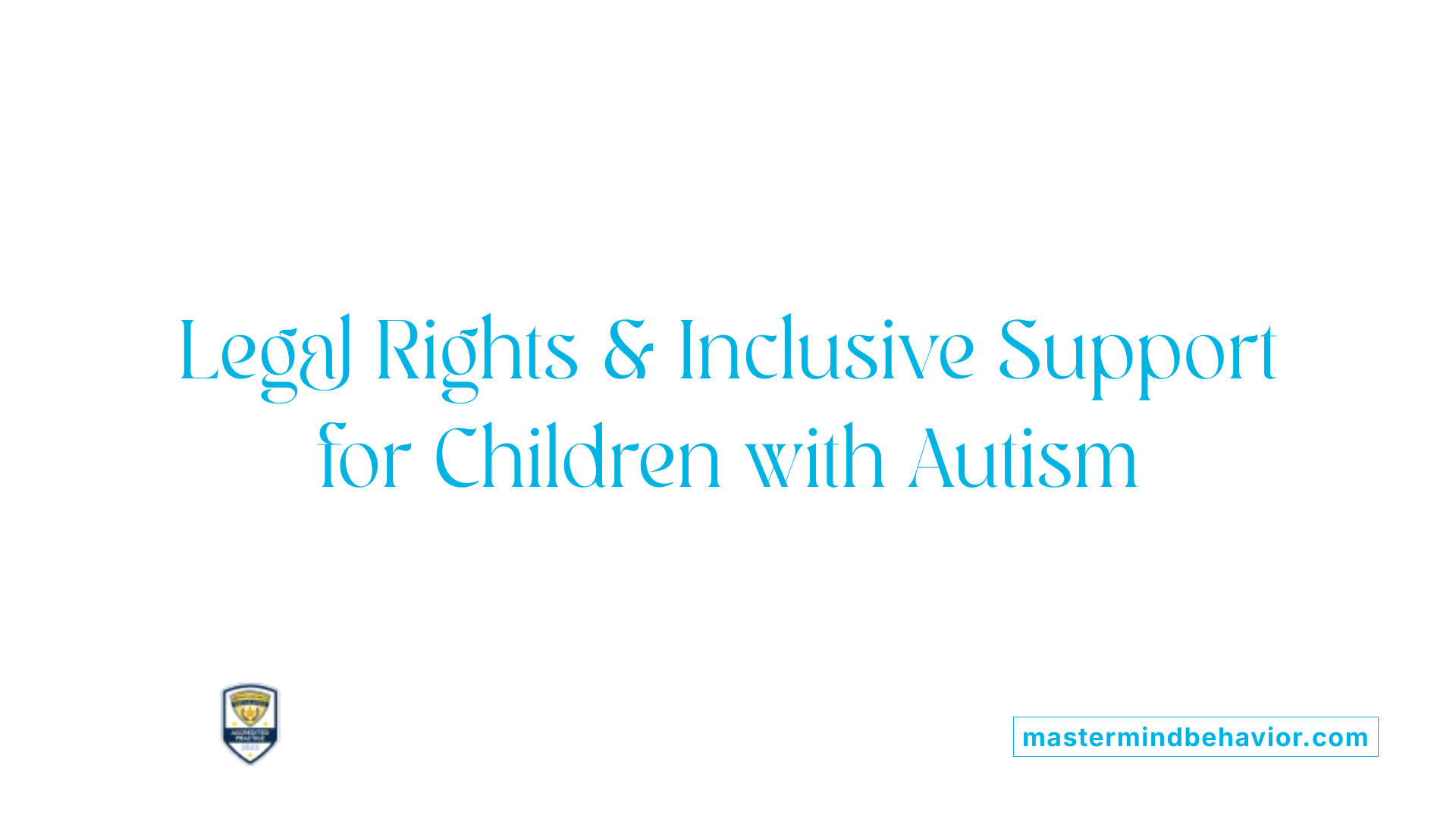
What is the Role of the ADA in Promoting Inclusion?
The Americans with Disabilities Act (ADA) plays a crucial role in ensuring that children with autism receive inclusive support in community and educational settings. It mandates that children with disabilities, including those on the autism spectrum, have equal access to services and activities. This means that daycares and schools must accommodate these children to foster their participation alongside their peers.
How Are Reasonable Accommodations Provided in Play Settings?
In natural play environments such as daycare centers, reasonable accommodations might include adapting activities to meet specific developmental needs. For example, staff trained in ABA reinforcement strategies use prompting and positive reinforcement during play, ensuring children with autism can engage in social games like cooperative puzzles or pretend play. These modifications help reduce barriers and encourage interaction in a naturalistic setting.
Why is Integrating ABA Approaches Important in Community and Educational Environments?
Integrating ABA-based interventions within community and educational environments strengthens the consistency and effectiveness of support for children with autism. Daycare staff, often coached by behavior therapists, use ABA principles like the ABC model to tailor interventions to each child's needs, supporting communication and social engagement. This integration promotes skill generalization from therapy to everyday activities, reducing challenging behaviors and improving overall outcomes.
Together, the ADA’s legal framework and embedding ABA strategies within inclusive settings ensure that children with autism receive compassionate, effective support that respects their rights and encourages their development.
Advancing Peer Engagement Through ABA Therapy
ABA therapy, particularly when combined with naturalistic developmental approaches, represents a powerful tool in increasing peer engagement among children with autism during play. Through individualized, data-driven interventions and collaborative efforts among specialists, families, and educational or daycare providers, children can develop vital social skills in meaningful, natural contexts. Continued progress monitoring and support aligned with legal frameworks ensure that these interventions remain effective and inclusive, ultimately fostering better social connections and quality of life.
References
- Promoting Peer Engagement for Young Children on the ...
- How ABA Therapy Works in Daycare Settings
- Applied Behavior Analysis (ABA)
- The Top 10 Reasons Children With Autism Deserve ABA
- Applied Behavior Analysis (ABA)
- 6 Benefits of ABA Therapy for Children with Autism
- Applied Behavior Analysis (ABA)
- Applied Behavior Analysis (ABA)
- The Controversy Around ABA
- Treatment and Intervention for Autism Spectrum Disorder










